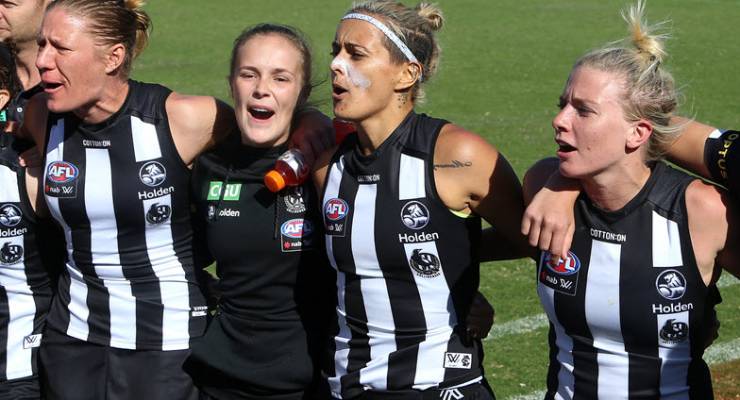
In her 1992 classic, Backlash: The Undeclared War Against American Women, Susan Faludi argues that perceived or real strides toward gender equality are predictably accompanied by a “backlash” to inroads made. “If fear and loathing of feminism is a sort of perpetual viral condition in our culture, it is not always in an acute stage,” she writes. “Such flare-ups are hardly random … they have always arisen in reaction to women’s progress.”
More than two and a half decades later, Faludi’s words ring true in many spheres of life — and not just in America. Just look to the great strides of progress made in women’s sport in Australia over the last few years. In February 2016, the AFLW arrived earlier than anticipated, and took its detractors and non-believers by surprise when it packed out Ikon Park — a venue eight times larger than the one the AFL had originally set aside for it. Women and girls in particular experienced this moment as a kind of emotional exorcism — an outpouring of grief and relief at more than a century of marginalisation and exclusion from the nation’s indigenous and most popular game.
Just one year after its arrival, however, the competition was already seemingly in grave danger. Ratings in season one rivalled or even trumped that of the AFL men’s competition, but by season two, promotion was near non-existent, while Channel Seven relegated games to subsidiary channels or pay TV alone. At Ikon Park, players battled in darkness while AFLW boss Nicole Livingstone admitted the AFL hadn’t “budgeted” for lights. A fortnight out from the grand final, a venue had yet to be decided, despite the presence of an interstate team in the game. Mid-way through the year, the AFL spoke of a desire to shorten the competition despite having expanded it by two teams. By September, those plans were set in stone, and the competition split into two “conferences” despite the increasingly loud protests of its playing body and fans.
In the face of this outcry, recognised voices in men’s AFL began to weigh in on the state of AFLW. Mark Robinson, chief football writer at the Herald Sun, wrote that the women of AFLW were demonstrating a “sense of entitlement” in expecting a season in which teams played each other once. He further demeaned the women’s game as of “average” standard and said it was played in “slow-motion”. “Most of half of the population won’t give it a second thought.”
Robinson’s piece was an extraordinary assault on the women who play and love Australian rules football, all the more extraordinary for its assumption that women were somehow “entitled” in asking for a competition of integrity or basic resources required to play to a standard men have come to expect.
But he is by no means alone in his critique of the competition. Last Friday, coaching legend Mick Malthouse added his thoughts on how to “improve” the game aesthetically and make it “safer” for women. On a panel with ALFW star Mo Hope and former AFL player Jason Akermanis — which Hope walked out of — Malthouse asserted that he did not want his granddaughters to play a game that was “rough and tough”:
I don’t like [AFLW] in its present format … they subject themselves to massive injuries. I suggested the ball should be smaller and should be no bumps and only tackle, not go to ground, that would make it uniquely women’s football.
What Malthouse is really worried about, then, is not just the prospect of his granddaughters injuring themselves — but their choice to participate in what he deems an unfeminine pursuit; a game where women — as men do every day — autonomously decide to subject themselves to the risk of injury in a contact pursuit. That Malthouse assumes it his prerogative to determine what his granddaughters can or cannot do is telling in this regard; it is he who feels “entitled” to control over their bodies and decision-making.
Such a reversion to traditional gender roles was also reflected in talkback calls on Melbourne radio station 3AW where Susan Alberti featured to defend the actions of Hope, with several men calling in to denigrate the competition with what they framed as a concern about AFLW’s impact on women’s “reproductive systems”.
If that sounds like a further regression to an era where men felt entitled to control women’s reproductive decisions, let’s take pause to consider that the backlash to AFLW is precisely an attempt by those who feel threatened by the progress made in women’s sport to reassert their power and privilege.
The very public backlash played out by AFL heavyweights like Robinson and Malthouse is yet another reminder that we are in a stage of what Faludi calls “acute” resistance. If that is a deflating note to end on, let us also remember that it is a sure a sign, as ever, that genuine strides for gender equity are being made. This is not only true of AFLW, but also the women’s cricket (screened to a record-breaking audience in the millions) and the inaugural NRLW, where the Brisbane Broncos just etched their names into the history books. We are now part of a generation where girls are born believing that a career in sport is their birthright — and that’s worth fighting for.








Kate, I think this story should be titled the backlash against women in AFL.
I haven’t noticed a similar backlash in cricket, football, basketball and the other sports that took women seriously years ago.
Have a look on youtube, there are countless videos and montages of “WNBA Fails” and “Men Destroying Women in Tennis”. And the comments….good lord the comments!
Yes and no. I think mens’ AFL will have to be shortened and changed too. So many becoming arthritic cripples at a young age, given the strain on their bodies and brains due to concussion.
It’s a pity Gillon McLaughlin hasn’t woken up to the value of AFLW.
I think the womens football of all codes is fantastic,and what the hell is that homophobic dinosaur Malthouse going on about?
And why has’nt anybody especially complained about that promotion of cricket on Fox and channel 7?… The promo starts off as usual with all the major ex cricket stars from Gilcrist to Warne and not a mention or sight of a woman player.
The final scene is a beach cricket scene,with still no women in sight,and suddenly an Aussie cricketer jumps into the water to catch the ball and guess what? yes it is a female with soaking wet cricket gear on and bloody Warnie leaning over the stand leering and salivating on the female player with the ‘wet”clothes on!
Come on all you Feminist Male and Female out there,where is the outrage? i cant hear you!…. come on start complaing about this obvious sexist ad…come on.. i still cant hear you!….
It’s Fox and Seven. What do you expect?
I would also suggest there is some quite basic homophobia in the comments by people like Malthouse.
He is concerned that the sport is too ‘rough and tumble’. This is a commonly used code for ‘unfeminine’ or ‘butch’.
What he is, in essence, saying is that he doesn’t want his granddaughters to play the game and have people assume they aren’t feminine. He basically doesn’t want people to think his granddaughters (and other players) might be lesbians.
Obviously the article has been written by an unbiased woman – but who cares about the controversy ? Are there any actual numbers available – e.g. attendance figures , viewing audience, etc to see how the population is taking to these newer forms of TV viewing which fill the time available for transmission.
Also we should be open minded what sport is – pole dancing has been accepted as a competitive sport activity in the USA – in the hope of gaining admission to Olympic competition. Water ballet ,synchronised swimming is already included as an Olympic sport. So why do people get there knickers in a knot? – or can that be a new sport?
You can’t get the numbers until the sport become established or the numbers will be rubbish, won’t they?
It is a tactic that men use to belittle women and the spaces that they hope to enter into by comparing the extremes. Talking about football and, right on queue, Des brings up pole dancing. Well done!
1 Did you actually read the comment ? 2 Did you actually understand it ?